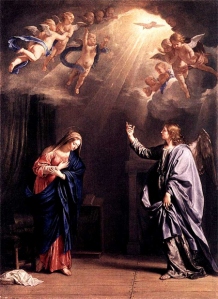The Word made flesh

Incarnation of The Word
Jesus was conceived by Mary through the power of the Holy Spirit, the perfect union of the human and the divine. Mary was conceived through the love of her parents, Joachim and Anne. Mary was fully human, never divine. Because she was chosen to be the theotokos, the God bearer, it is a dogma of our faith that Mary was conceived and born without the stain of original sin and was filled with the sanctifying grace of baptism. We celebrate her Immaculate Conception each year on December 8th.
The Word, Logos in Greek, is God who became flesh (a fully human person.) It is important to understand that the Word never changed. At the moment of his conception in Mary’s womb, without the seed of man but through God’s almighty power, the human body and soul of Jesus were created and the divine Word assumed the man that was conceived. The Word became man, taking on the perfect human form, with a body and soul. The Word became flesh.
Jesus was fully human; he had a human soul and a human body. His mind contained human knowledge, which was always united with his divine wisdom. He possessed both human and divine wills which worked in perfect union with each other.
The Council of Ephesus (AD 431) declared that Jesus was the divine Son of God who became man in the womb of Mary. The one who was born of Mary is the Word, the same person who has existed with the Father and the Holy Spirit from all eternity.
We call this the Incarnation of Jesus Christ, the Word made flesh. The word incarnate, derived from the Latin incarnari, means to “be made flesh,”
Understanding the incarnation of Jesus provides us with fresh insight as to why we bow during our recitation of the Creed when we say “…and by the Holy Spirit was incarnate of the Virgin Mary, and became man.”
While the miracle of birth is certainly worthy of our praise and thanksgiving to God, the incarnation of the Word through the power of the Holy Spirit and the joyful acceptance of Mary to be the Incar is beyond measure. We should bow at the very thought of it.
